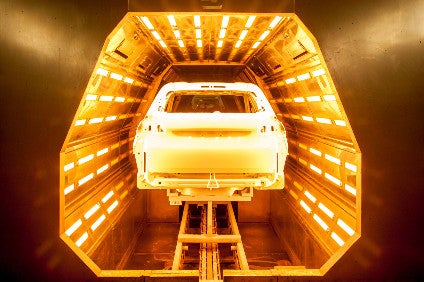
The perennial rivalry between the optimistic and the pessimistic about what the Brazilian market will be like this year has hit a peak in the last few weeks.
Stefan Ketter, president of FCA Latin America and chief executive officer in Brazil, agrees with auto lobby group Anfavea – he still believes in a recovering second half and a bottom line of minus 7.5% (2016 vs 2015) or something in the vicinity of 2.38m light and heavy vehicles.

Discover B2B Marketing That Performs
Combine business intelligence and editorial excellence to reach engaged professionals across 36 leading media platforms.
Said Ketter: “The Brazilians are extremely critical when speaking about themselves, which does not make any sense. One must believe more in one’s talent, believe more in our people.”
The positive attitude might have something to do with 2015 market leader Fiat having two new products this year (the recently launched Toro pick-up and the Mobi subcompact expected next month). Jeep, the other FCA brand, is also doing well, with a brand new manufacturing plant in Goiana, in the northeastern state of Pernambuco.
Four days later after Ketter spoke, Dan Ammann, world president of GM, toured Brazil and expressed deep worries about the local economy and political direction.
“We will be forced to reconsider the BRL6.5bn/US$1.7bn investment in Brazil if the scenario does not improve by mid-2017,” he told O Estado de S. Paulo newspaper. He added the country was not competitive, generally speaking, including exports even if the dollar climbs to BRL4.50 (currently BRL3.80). He predicted that, this year, a maximum of 2m units would be sold, a hefty 22% downturn that, compounded with 2015 vs 2014’s 27% fall, would top 55%.
Two days after Ammann, David Powels, president of Volkswagen of Brazil, fully acknowledged difficult times for the auto industry yet he did not talk of investment halts or plan postponements. His focus was on the brand, referring to image damage due to the diesel engine scandal, and choosing instead to talk about work to boost both productivity and quality at the four Brazilian plants through strong training.
“We will keep increasing our exports,” he said.
Four more days went by and it was the turn of JAC Motors president Sérgio Habib, renowned for mastering statistics, comparing what is going on in Brazil today to other market-plummeting countries in recent years: the US, Spain, Italy and Portugal.
“Nothing says we are different from others. This year we shall endure a new, over-20% slump and it will be quite unlikely to reach 2m vehicles sold (including heavy trucks). We are back to 2006 levels.”
As for the future he was even more pessimistic: we would match 2013 numbers only by 2022-2023.
Bottom line of the four executives’ statements: clearly a time of sweat and tears ahead. Rising unemployment, out of target inflation and fiscal imbalance are discouraging.
William Ward, a British theologian (1812-1882) coined the phrase: “The pessimist complains about the wind; the optimist expects it to change; the realist adjusts the sails.”
Brazil’s big problem is how and who will adjust the sails, if the politicians allow it.






